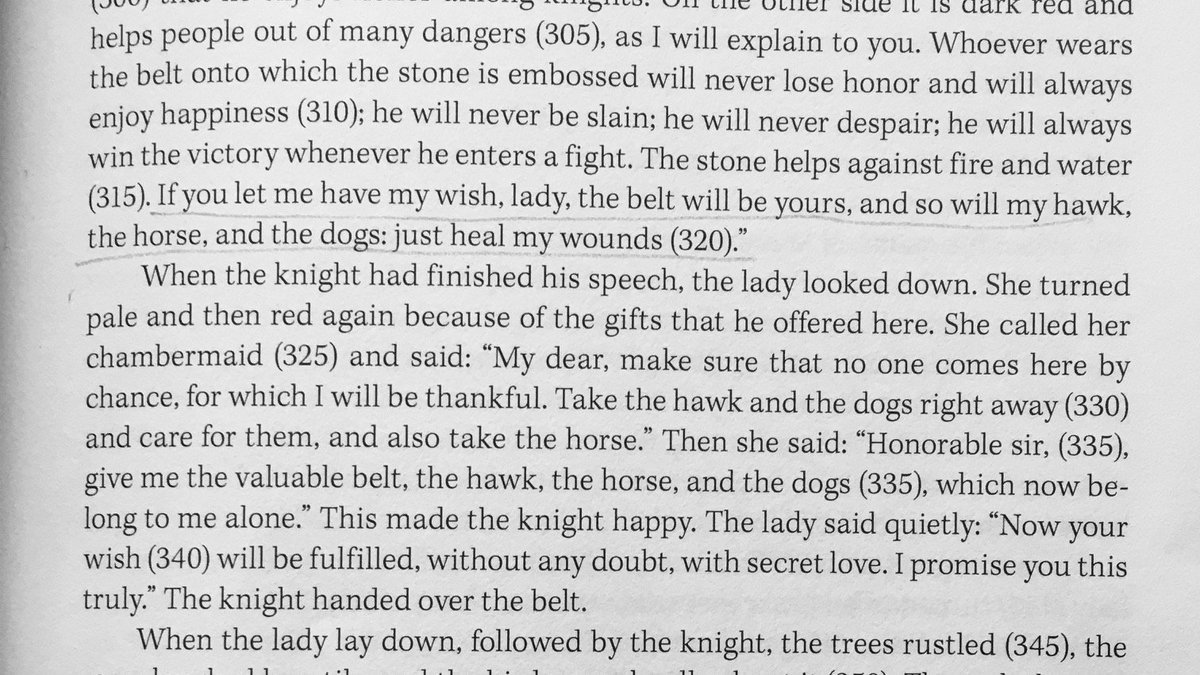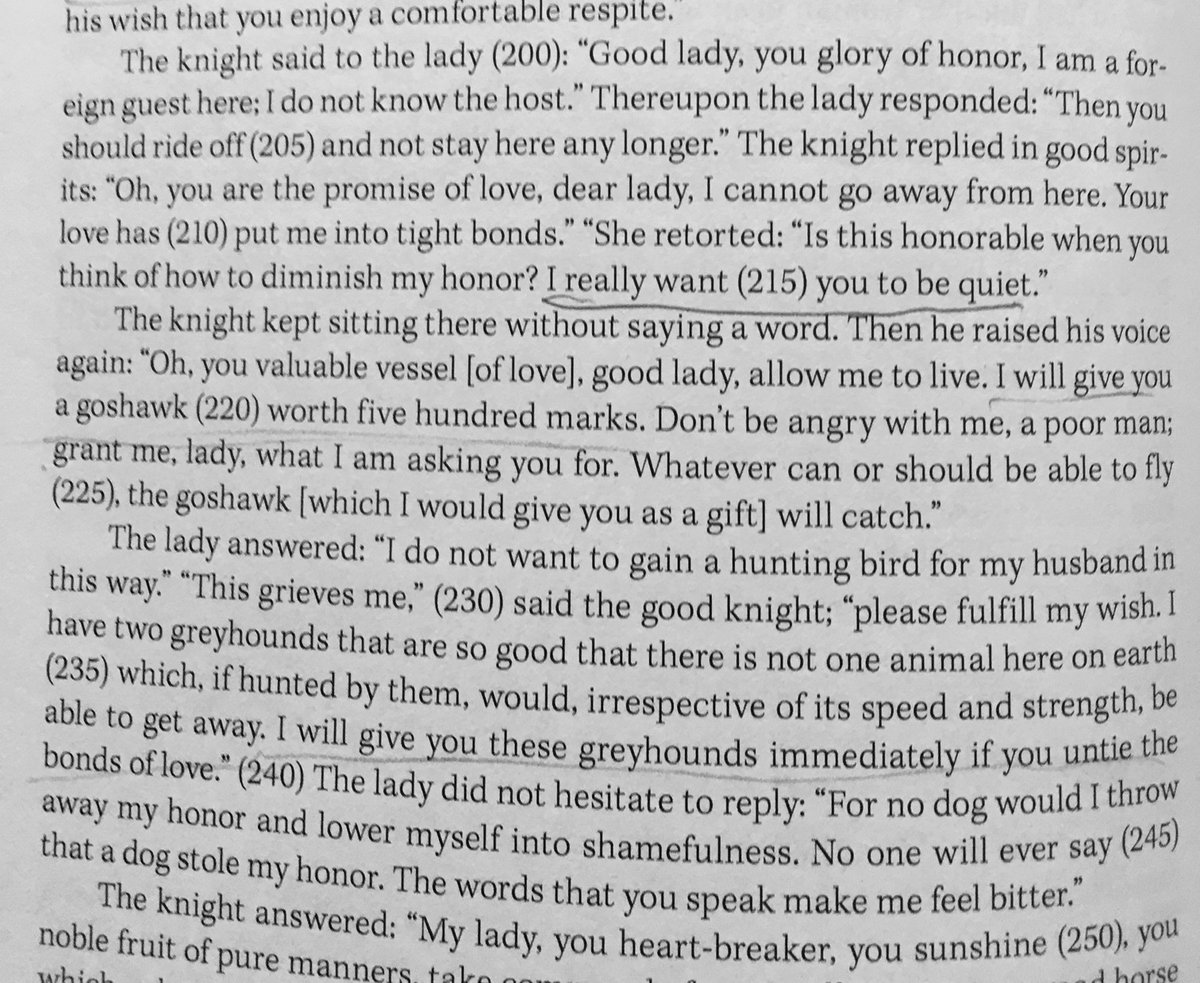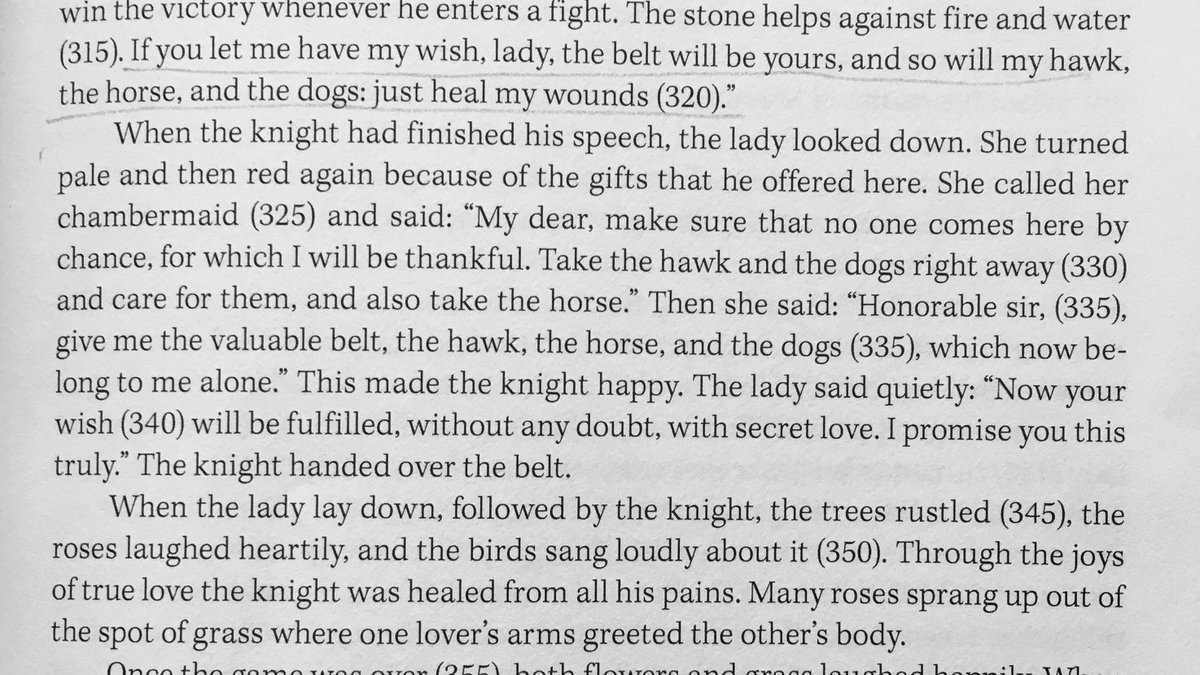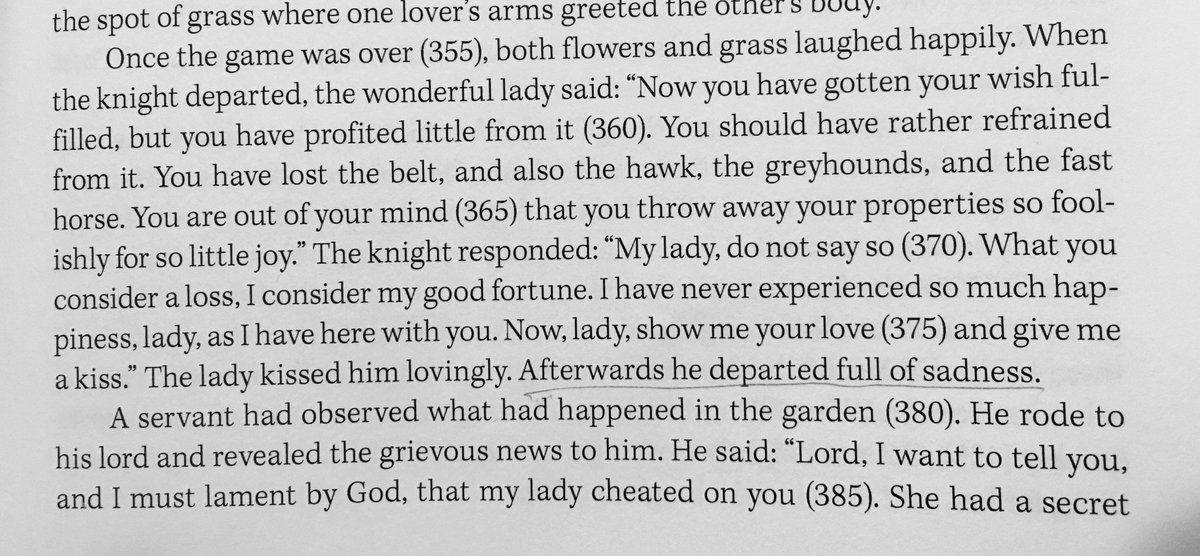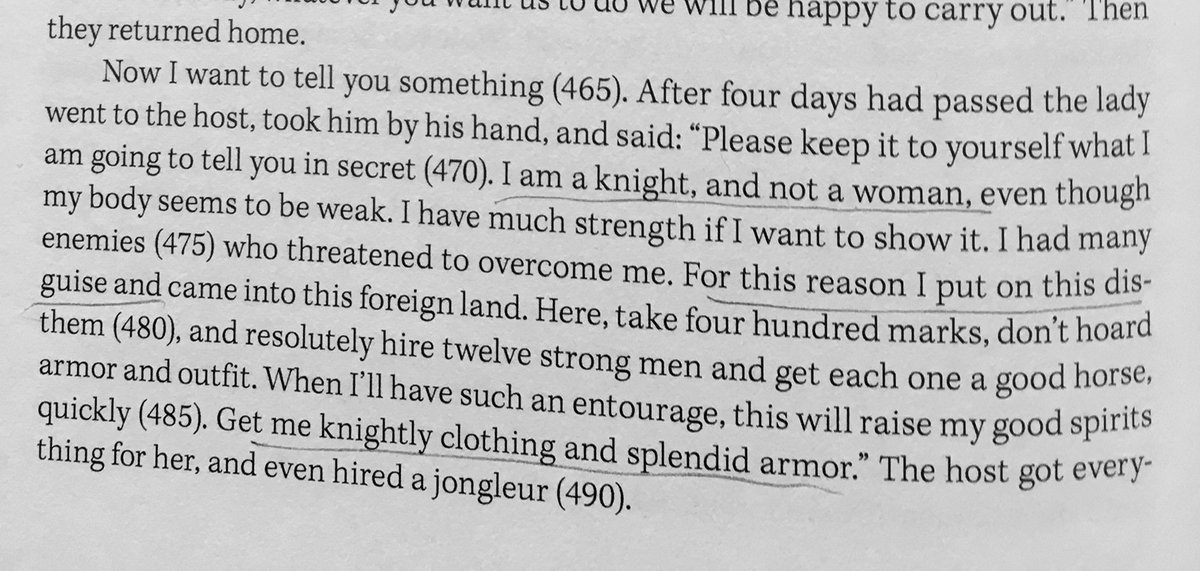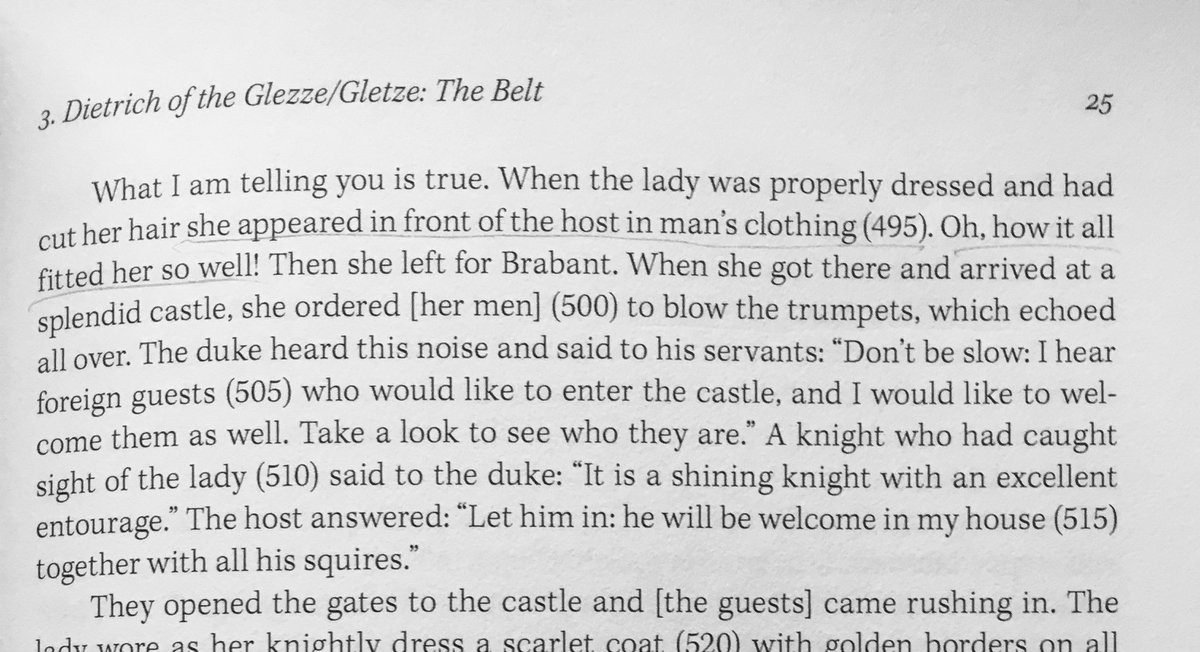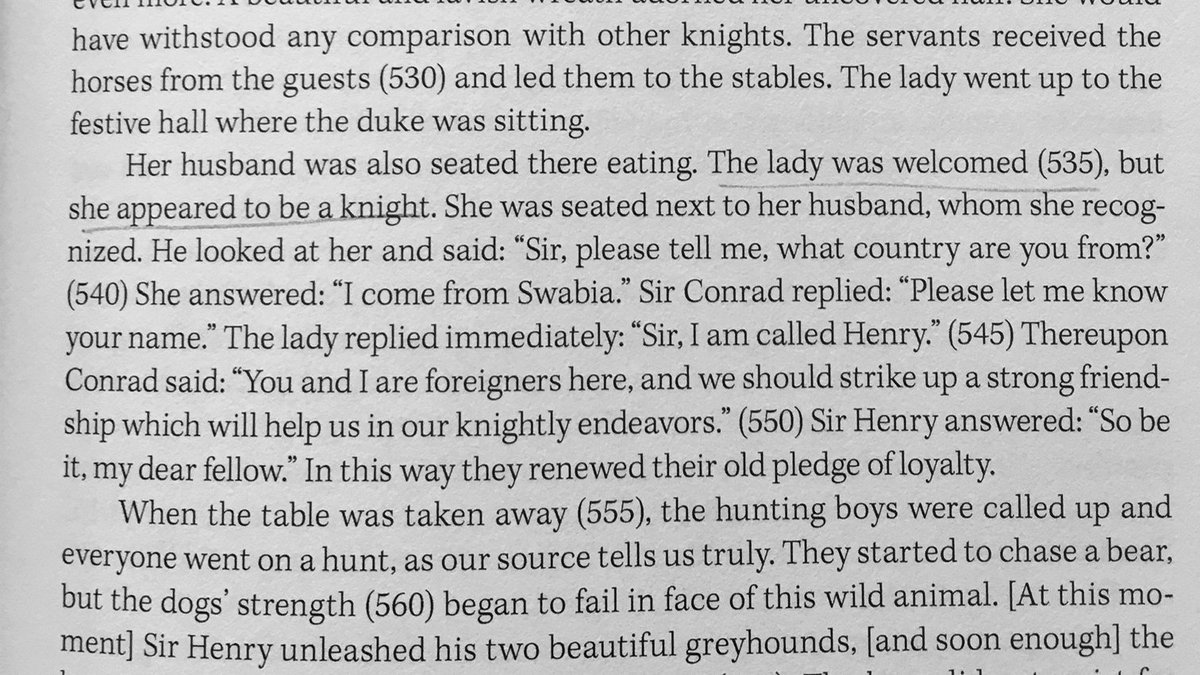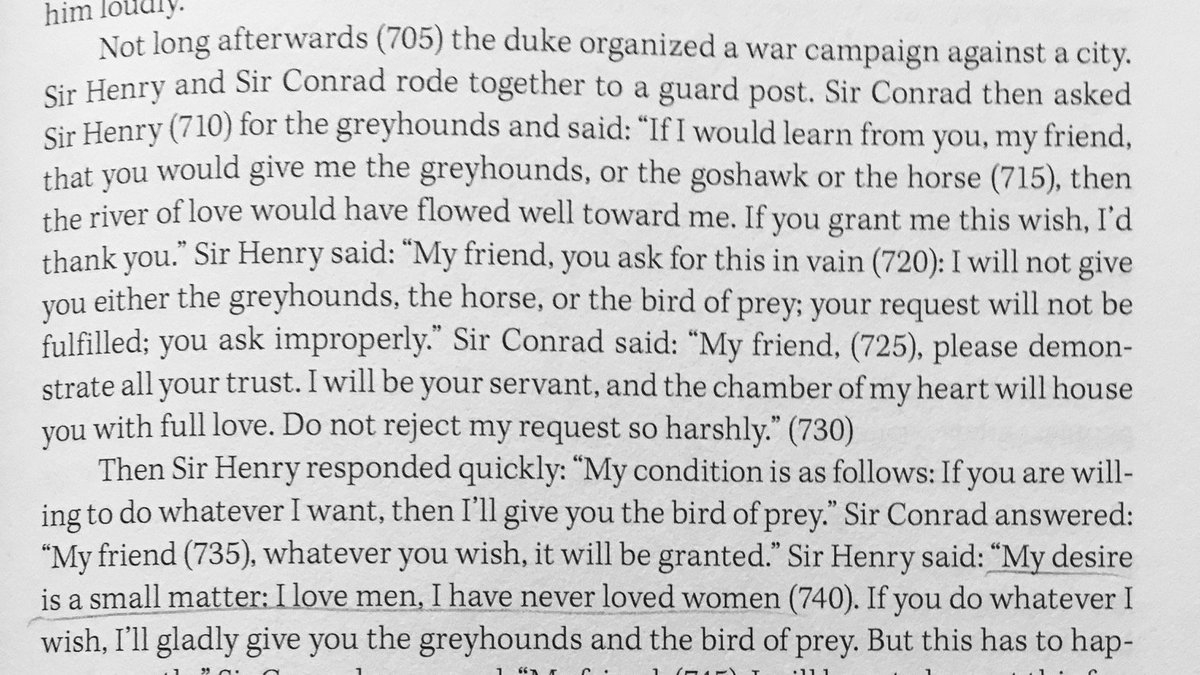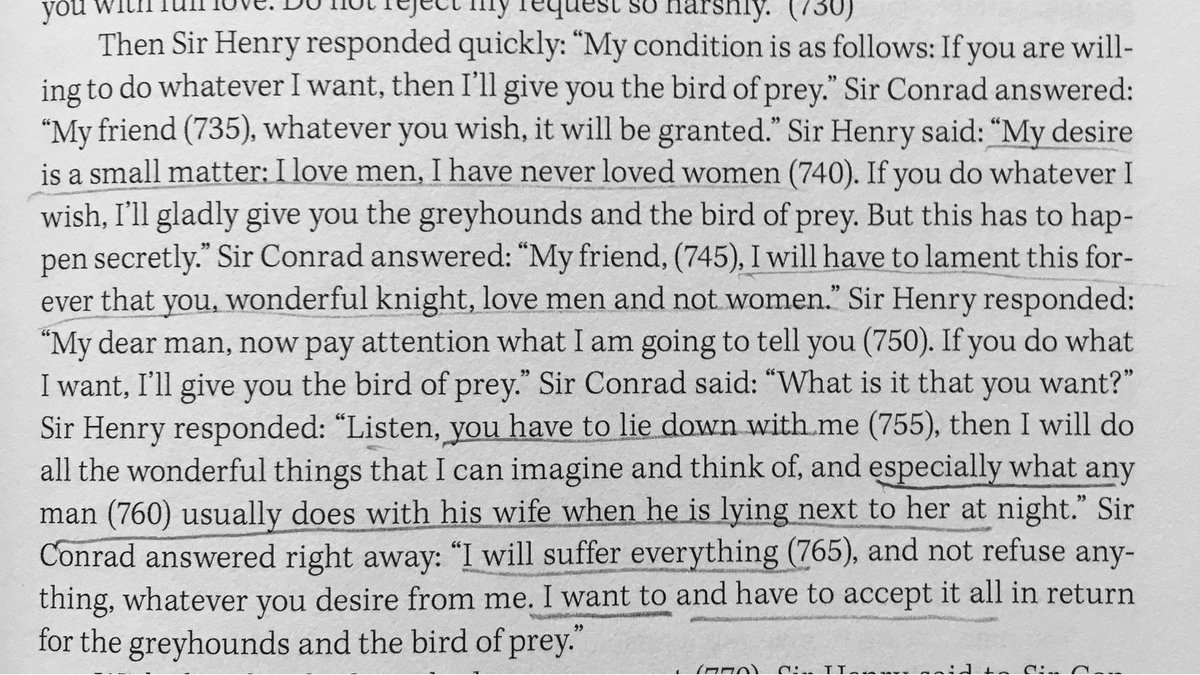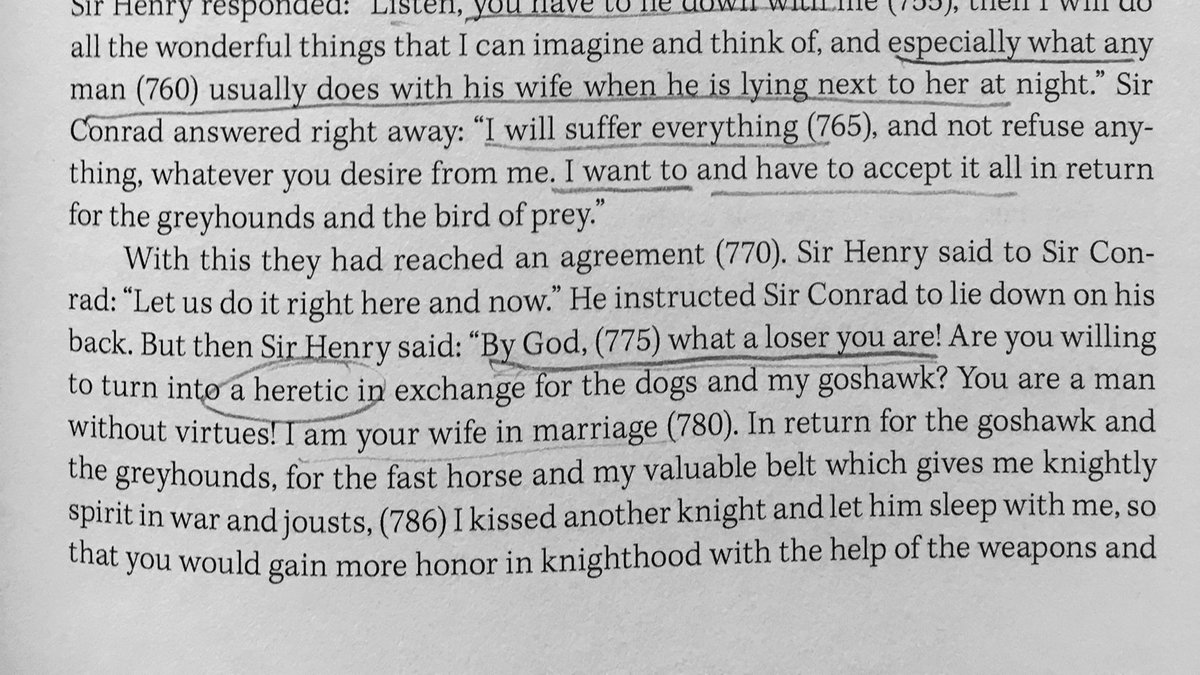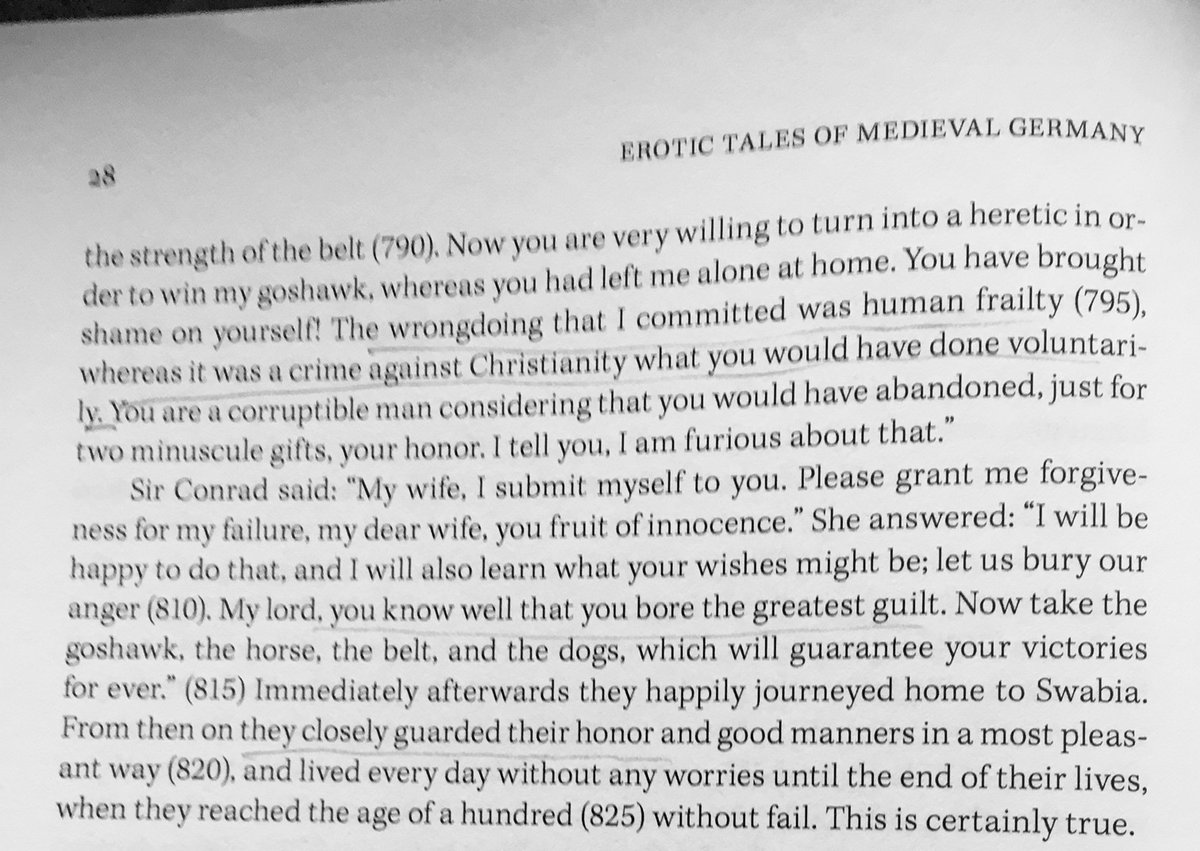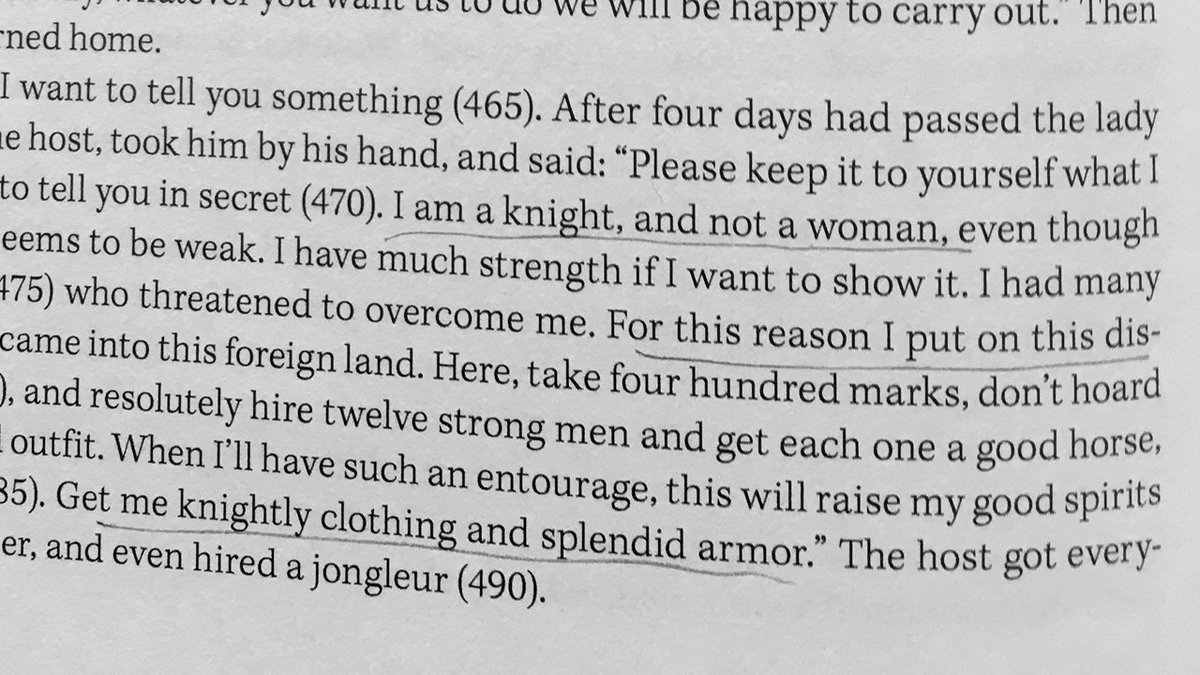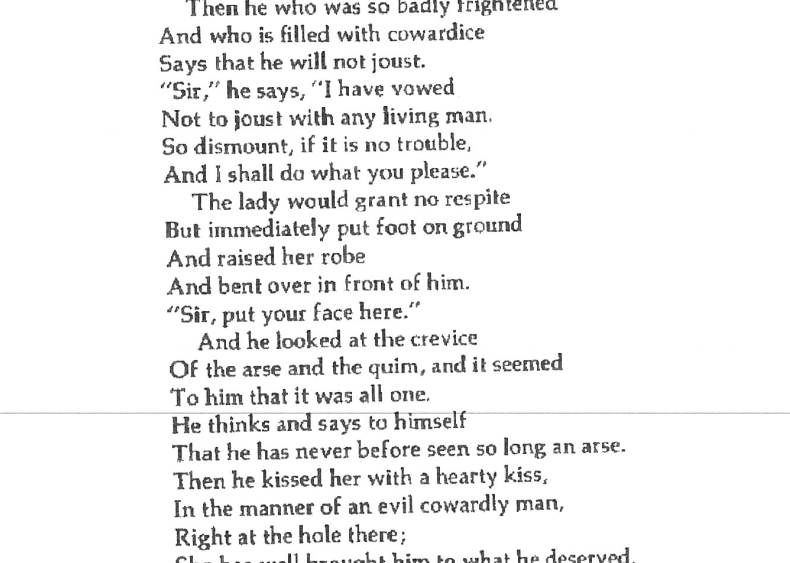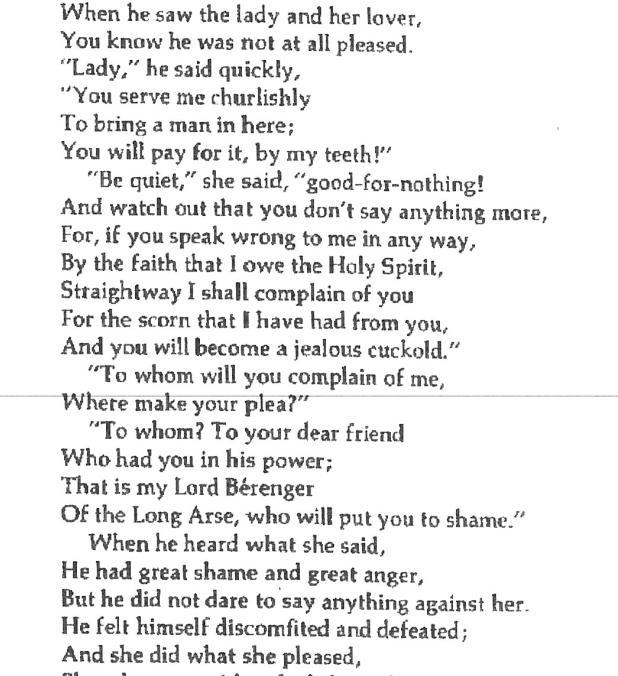Have I got a *wild* medieval story for you.
A woman sleeps with someone in exchange for presents, and her husband gets mad. So she sets out to prove that her husband would ALSO allow a man to have sex with him in exchange for presents. #MedievalTwitter
A woman sleeps with someone in exchange for presents, and her husband gets mad. So she sets out to prove that her husband would ALSO allow a man to have sex with him in exchange for presents. #MedievalTwitter
This is a 13th-century German story by a writer named Dietrich of the Glezze/Gletze.
And it is a LOT. It's also a fascinating insight in how complicated medieval ideas of sexuality and gender could be.
[TW: sexism, homophobia, rape culture]
And it is a LOT. It's also a fascinating insight in how complicated medieval ideas of sexuality and gender could be.
[TW: sexism, homophobia, rape culture]
So. There's a married couple, both beautiful and virtuous. One day, while her husband is gone, the woman is sitting in her garden. A strange knight passes by, is lovestruck by her beauty, and approaches her. Basically, he confesses his love and begs her for sex.
She refuses. He offers her increasingly lavish presents--a goshawk! two greyhounds! a horse!--pleading with her. She turns them down, until he offers her his belt, which is magic: the wearer will win any fight.
He also throws in all the other presents to sweeten the deal.
He also throws in all the other presents to sweeten the deal.
It's hard to know how to read this scene. Is it meant to be romantic or threatening? The powerful stranger intruding into her garden, demanding sex, feels deeply alarming. She doesn't *seem* frightened of him, just insulted, however. She even tells him to be quiet and go away.
When she finally agrees, she sends away her servants, and she and the knight have sex. The sex is apparently so good that the trees rustle, birds start singing about it, and roses bloom from the ground where they are lying down.
Then she tells the knight that she got the better of the deal and sends him away forever.
Unfortunately, a servant spotted her and tells her husband, who is furious and leaves her. She sort of shrugs and says she deserves it but he will soon get over it.
Unfortunately, a servant spotted her and tells her husband, who is furious and leaves her. She sort of shrugs and says she deserves it but he will soon get over it.
This is when the story really gets wild.
She waits a few months, then gets all her presents--hawk, greyhounds, horse, belt--and some money, and sets off to win him back. She stays in an inn, where she sends her servants home before she begins Her Plan.
She waits a few months, then gets all her presents--hawk, greyhounds, horse, belt--and some money, and sets off to win him back. She stays in an inn, where she sends her servants home before she begins Her Plan.
She tells the innkeeper that she's actually a man in disguise, and that he needs to go out and buy her men's clothes, weapons, and armor.
He accepts this and buys her everything. She cuts her hair, dons the clothes (which look GREAT on her), and puts on her magic belt.
He accepts this and buys her everything. She cuts her hair, dons the clothes (which look GREAT on her), and puts on her magic belt.
Then she goes to her husband's court and announces herself as Sir Henry of Swabia.
At this point, the narrator switches pronouns and names, describing Sir Henry consistently as a man.
At this point, the narrator switches pronouns and names, describing Sir Henry consistently as a man.
The husband and Sir Henry do everything together. They go hunting, and Sir Henry's greyhounds are so good at it that the husband begs Sir Henry for them. Henry refuses. Henry's hawk is such a good hunter that the husband also begs for that. Henry refuses.
Then they race their horses home, and Sir Henry easily beats the husband. The husband again offers enormous amounts of money for the horse, which Henry refuses.
There's a tournament, where an amazing Briton beats everyone. The husband warns Sir Henry not to fight the Briton. Sir Henry insists on doing so and beats the Briton easily.
The husband BEGS Sir Henry to teach him and to give him his amazing animals.
The husband BEGS Sir Henry to teach him and to give him his amazing animals.
Sir Henry refuses at first, but the husband keeps offering things. Then Sir Henry finally relents and says the husband can have everything if he agrees to Henry's request. The husband says he will do anything.
Sir Henry says "My desire is a small matter: I love men."
Sir Henry says "My desire is a small matter: I love men."
The husband says it's sad that such a wonderful knight should love men and not women.
Sir Henry tells him that he must fulfill Henry's wish if he wants all these presents. The husband asks what the wish is.
Sir Henry says he wants to have sex with the husband.
Sir Henry tells him that he must fulfill Henry's wish if he wants all these presents. The husband asks what the wish is.
Sir Henry says he wants to have sex with the husband.
The request is *fascinating*. Henry says the husband should "lie down" with him, and that Henry "will do all the wonderful things that [he] can imagine and think of." 
But *especially* Henry will do what a man does to his wife (aka, intercourse).

But *especially* Henry will do what a man does to his wife (aka, intercourse).
The husband *immediately* agrees and says he will "suffer everything and not refuse anything."
He adds--and I think this is really telling--"I want to and have to accept it all in return for the greyhounds and the bird of prey."
"I want to"
He adds--and I think this is really telling--"I want to and have to accept it all in return for the greyhounds and the bird of prey."
"I want to"

Sir Henry says that they will do it right then and there.
He tells the husband to lie down on his back. The husband does.
Then Sir Henry calls him a loser.
He tells the husband to lie down on his back. The husband does.
Then Sir Henry calls him a loser.
Sir Henry announces that he's the wife and CHEWS the husband out for agreeing to be a "heretic" with another man.
The wife, basically: "Yes, what I did was bad, but this is SO MUCH WORSE, you loser. Also, I held out for a LOT more presents than you."
The wife, basically: "Yes, what I did was bad, but this is SO MUCH WORSE, you loser. Also, I held out for a LOT more presents than you."
Then she tells her husband that they are going home and that they will agree to forget this, because--as she says--he "bore the greatest guilt."
And then they go home and live happily ever after!
And then they go home and live happily ever after!
There is a LOT that could be said about this story. There's a clear assumption that some men prefer other men. The author seems to think being a bottom is equivalent to being a woman.
Most interesting, I think, is the lack of reaction to cross-dressing.
Most interesting, I think, is the lack of reaction to cross-dressing.
AFAB people often dress and live as men in medieval texts, and, as with this text, their pronouns are usually respected and they aren't often deadnamed.
But AMAB people are usually *heavily* condemned for wearing "women's" clothes. But the innkeeper doesn't bat an eye at it.
But AMAB people are usually *heavily* condemned for wearing "women's" clothes. But the innkeeper doesn't bat an eye at it.
It all just goes to show the wide variety of medieval responses to gender and sexual minorities. The husband thinks Sir Henry's preferences are a shame but doesn't denounce him. The wife does. The narrator is curiously silent on the morality of the entire matter. ¯\\_(ツ)_/¯
Update: Wow, glad so many people like this!
I will say that most of the story's elements aren't particularly unusual. As I suggested, the innkeeper's lack of a response to an AMAB person wearing "women's" clothes strikes me as the most unusual for a medieval text.
I will say that most of the story's elements aren't particularly unusual. As I suggested, the innkeeper's lack of a response to an AMAB person wearing "women's" clothes strikes me as the most unusual for a medieval text.
Everything else basically has precedent. AFAB people becoming knights? All over the place, perhaps most famously in the French Roman de Silence.
Authorial respect for pronouns? Widely attested. https://twitter.com/erik_kaars/status/1143478441582452737
Authorial respect for pronouns? Widely attested. https://twitter.com/erik_kaars/status/1143478441582452737
Men trading sex with each other for presents? It's at least joked about in sources including Viking texts. https://twitter.com/erik_kaars/status/1179412009789599746
Women going in disguise to humiliate their husbands and gain the marital upperhand? Very very well popular. My favorite example is De Berangier Au Lonc Cul [Berenger of the Long Asshole]: a woman dresses as a knight and challenges her cowardly husband, who --
-- begs the knight for mercy. So the knight says the husband must kiss the knight's bare asshole. The husband agrees, the knight drops trou, and the husband gives the asshole a "hearty" kiss.
(He is also confused by the knight's genitals and thinks it's all one long asshole)
(He is also confused by the knight's genitals and thinks it's all one long asshole)
The knight states he's "Berenger of the Long Ass" and then leaves. The husband returns home to find his wife in bed with her lover. He gets mad and she says, "Don't make me get my friend Berenger."
And from then on, she does whatever she wants.
And from then on, she does whatever she wants.
Anyway, what strikes me as unusual about "The Belt" is that innkeeper's relative acceptance of an AMAB person in "women's" clothing, which has less medieval precedent that I know of, though the case of Eleanor Rykner is close. https://twitter.com/erik_kaars/status/1143535993804480513?s=20

 Read on Twitter
Read on Twitter
![This is a 13th-century German story by a writer named Dietrich of the Glezze/Gletze. And it is a LOT. It's also a fascinating insight in how complicated medieval ideas of sexuality and gender could be.[TW: sexism, homophobia, rape culture] This is a 13th-century German story by a writer named Dietrich of the Glezze/Gletze. And it is a LOT. It's also a fascinating insight in how complicated medieval ideas of sexuality and gender could be.[TW: sexism, homophobia, rape culture]](https://pbs.twimg.com/media/Es0RlFBXMAA6eea.png)
